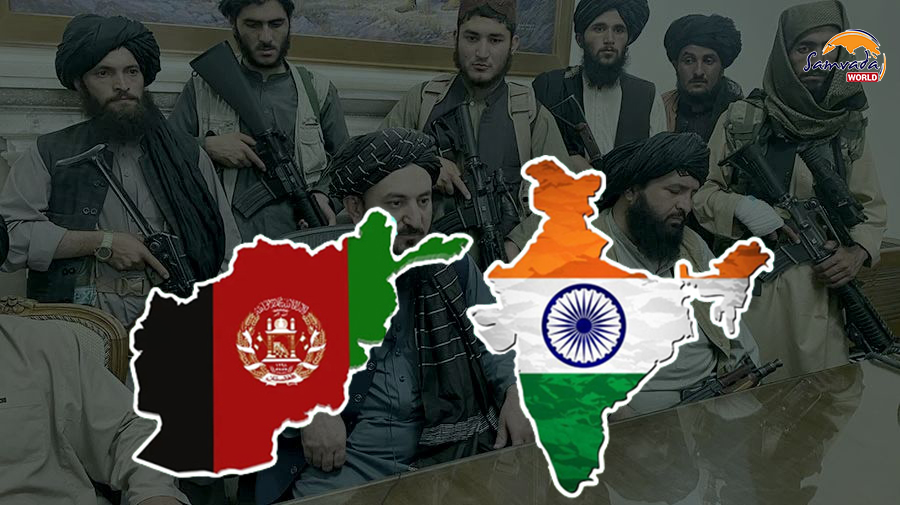
- India should cautiously move forward with the Taliban, known to be inherently ‘anti-India’, which has shown no signs of improvement that it had guaranteed upon the takeover.
- The Taliban regime has consistently reiterated the need to resume bilateral relations between the two countries to recommence the halted infrastructural projects, visas to students, health care, etc.
- The chaotic situation in Kabul, along with the initiation of “foreign fighters” devising attacks on their neighbours reveals the sheer necessity of protecting national security for India.
India and Afghanistan have always shared an exceptional rapport dating back to the middle ages. It is no secret that the two countries have shared a rather positive bilateral relationship regardless of the ruling party in India, and Afghanistan’s constant internal tumults. India has consistently aided its counterpart and helped in redeveloping its society, with several architectural reforms and resources over the past two decades, which, however, came to an abrupt yet temporary halt after the Taliban’s takeover of the country in August 2021. Over a year after the occupation of Afghanistan, the Taliban has now iterated its desire for India to resume its investments and interests in the country to bolster its economy. The main question, however, remains whether India would reconsider—or perhaps reconfigure—its relationship with Afghanistan.
Indo-Afghan Friendship: Then and Now
India has been by Afghanistan’s side for as long as one can recall: its unsurmountable support to the country is well-recorded and admired globally. From restoring the historic Stor Palace to building the Afghan Parliament and the Salma dam, and promoting education for girls, along with huge exports of essential needs to the country, India’s contribution in redeveloping a war-trodden Afghanistan has cost the former USD3 billion—an effort that has been appreciated by the Afghan community, with almost 70% Afghans choosing India as the former’s “best friend”. Several thousand students migrate to India every year in the hopes of a better future and quality education, with the Indian government offering students fully-funded scholarships for their academic opportunities.
America’s hasty and messy exit in August 2021 and the subsequent, almost spontaneous collapse of the Afghan regime—with the Taliban moving into the parliament overnight—set the country back by a few decades once again. The country which had seen immense growth in the past few years through foreign aid and assistance in terms of education and livelihood is once again witnessing brutal human rights violations every day, including shutting down schools for women and girls, frequent bombings in the country, and a rapidly declining economy. Although the new Taliban regime has not received official recognition globally, it is still evident that the world has largely turned a blind eye to the deteriorating condition of the Afghan people.
India, a crucial power in the subcontinent, finds itself in a vulnerable position owing to the balance of power between India and its neighbours, China and Pakistan. India’s decision to close operations at the Indian embassy in Afghanistan, along with the temporary ban on student visas for the Afghans post-takeover indicate Delhi’s growing concerns regarding its national security. Having said that, it is also essential to note that while India has cautiously moved forward with Afghanistan, it also ensured a constant supply of humanitarian aid in terms of food and medicines, especially during the Covid-19 pandemic.
Ever since August 2021, the Taliban regime has consistently reiterated the need to resume bilateral relations between the two countries to recommence the halted infrastructural projects, issue visas to students and those seeking medical aid, and introduce further potential investments, which were extensively discussed during the first-ever diplomatic talks between India’s J.P Singh and Afghanistan’s acting foreign minister Amir Khan Muttaqi in June 2022 in Kabul.
What will India do?
As stated earlier, although the Taliban has not been globally recognised as the official ruling regime of Afghanistan, it has certainly been made abundantly clear that the world leaders have, unfortunately, accepted the regime in some way, and it is here to stay for the unforeseeable future. It is also pivotal to note that it is impossible to blatantly ignore the plight of the Afghan community due to its internal politics.
Though there has been a backlash by the Afghan community against India’s decision to ban the issuance of visas, it is crucial to reminisce the history between India and the Taliban, including the 1999 hijack of the Indian Airlines flight from Kathmandu to Delhi which was forcefully landed in Kabul, leaving several wounded. It is also imperative to note that Pakistani terror groups Jaish-e-Mohammad and Lashkar-e-Toiba recently shifted their bases to Afghanistan under the Taliban’s regime, indicating potential dangers to India’s national security. As stated by Rahmatullah Nabil, former Afghanistan intelligence chief, India should cautiously move forward with the Taliban, known to be inherent “anti-India”, which has shown no signs of improvement—or rather ‘modernisation’—as it had guaranteed upon the takeover.
The absurdly chaotic situation in Kabul, along with the initiation of “foreign fighters” devising attacks on their neighbours (including India and Tajikistan) reveals the sheer necessity of protecting national security for India and devising its next delegation based upon factual interpretation of the situation in the subcontinent.
(Shubhangi holds a master’s degree in International Relations from the Queen Mary University of London. She has authored articles on India’s vaccine diplomacy and the politics of gun reform in the US. Views expressed are author’s own)
